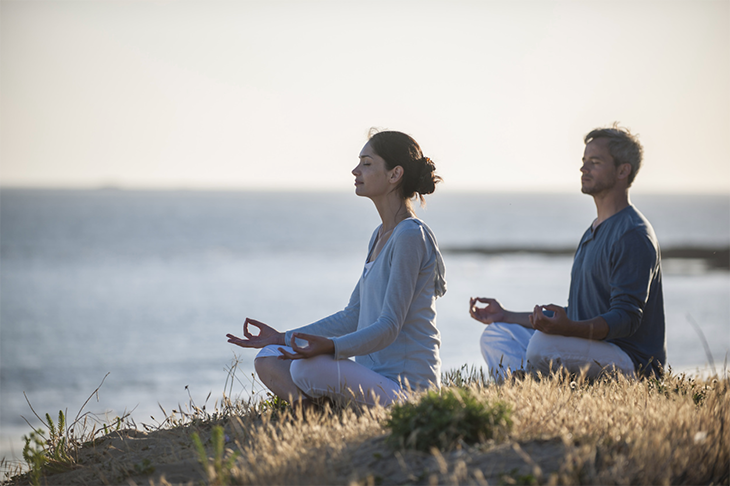
There hundreds of thousands out there that suffer from anxiety. Rather than resorting to antidepressants, a guided mindfulness-based stress reduction program may be just as effective as ‘the gold-standard’ antidepressant drug, escitalopram, for those who suffer from with anxiety disorders. This was according to a first-of-its-kind, randomized clinical trial that came from Georgetown University Medical Center.
“Mindfulness meditation currently is reimbursed by very few (insurance) providers,” said Elizabeth Hoge, MD. She is the director of the Anxiety Disorders Research Program and associate professor of psychiatry at Georgetown. “Our study provides evidence for clinicians, insurers, and health care systems to recommend and provide reimbursement for mindfulness-based stress reduction as an effective treatment for anxiety disorders,” she added.
“A big advantage of mindfulness meditation is that it doesn’t require a clinical degree to train someone to become a mindfulness facilitator,” Dr. Hoge said. “Additionally, sessions can be done outside of a medical setting, such as at a school or community center.”
The people who suffer from an anxiety disorders are already under duress. Symptoms are generalized anxiety, social anxiety, panic disorder, and fear of certain places or situations. The latter means that they may have an aversion to crowds and public transportation. When constantly exposed to these, the patient may resort to suicide, or the disorder can also lead to disability and distress. Those who have this oftentimes seek treatment in psychiatric clinics.
They are often prescribed drugs and these are oftentimes very effective. Unfortunately, those who need them sometimes have difficulty getting their hands on it. Then, there are those who do not respond to them or find the side effects inconvenient. That’s because they may end up feeling nauseated, drowsy, or experience sexual dysfunction.
Standardized mindfulness-based interventions, an example of which would be mindfulness-based stress reduction (MBSR), is able to lower anxiety. However, before this study was made, the interventions had not been studied to compare these to effective anti-anxiety meds.
For the said study, the clinicians recruited 276 patients between June 2018 and February 2020. The patients came from three hospitals in Boston, New York City and Washington, D.C.. They randomly assigned them to either MBSR or the common antidepressant drug escitalopram. The former was offered weekly for eight weeks through 2 1/2-hour in-person classes. This also came with a daylong retreat weekend class that took place in the 5th or 6th week as well as 45-minute daily practice exercises that they do from home.
The anxiety symptoms were assessed the moment they enrolled and once more when the completed the intervention program at eight weeks. There were also post-treatment assessments at 12 and 24 weeks after. The evaluators were not told which group the patients belonged to.
At the end of the study, around 102 patients had completed MBSR and 106 had completed their course of meds. The average age of the patients was 33, and this included 156 women, who were 75 percent of them. The numbers mirrored how the disease was prevalent in the United States.
Both groups of patients saw that the symptoms lowered with a 1.35 point average reduction for MBSR and 1.43 point reduction for the meds. This is statistically equivalent outcome. As for the mean of both groups, this dropped to around 4.5. This means that there was a notable 30 percent drop in the severity of the issue.
Olga Cannistraro, 52, said that she made use of the MBSR techniques when she needed it, but more than 10 years previously, the practice changed her life for the better. She was chosen for an MBSR study after she responded to an ad that asked, “Do you worry?”

“I didn’t think of myself as anxious — I just thought my life was stressful because I had taken on too much,” she said, looking back. “But I thought, ‘Yeah, I do worry.’ There was something excessive about the way I responded to my environment.”
After she took part in the study that was led by Hoge, she learned two vital MBSR techniques. “It gave me the tools to spy on myself. Once you have awareness of an anxious reaction, then you can make a choice for how to deal with it. It’s not like a magic cure, but it was a lifelong kind of training. Instead of my anxiety progressing, it went in the other direction, and I’m very grateful for that.”
“It is important to note that although mindfulness meditation works, not everyone is willing to invest the time and effort to successfully complete all of the necessary sessions and do regular home practice, which enhances the effect,” Hoge said. “Also, virtual delivery via videoconference is likely to be effective, so long as the ‘live’ components are retained, such as question-and-answer periods and group discussion.”
Hoge is the first author of the study was published this week in JAMA Psychiatry. She highlighted the fact that there are numerous phone apps that offer guided meditation. However, they still don’t know how these are when compared to the full in-person, weekly group classes.
The researchers also conducted a second phase of the study. This happened during the pandemic and it required moving the treatments to an online videoconference. This will be their focus for future studies and they also want to explore the effects of MBSR on sleep and depression.



